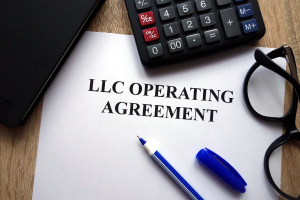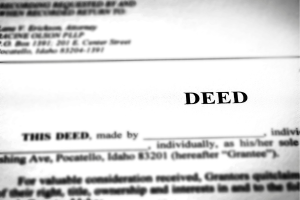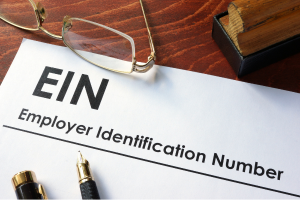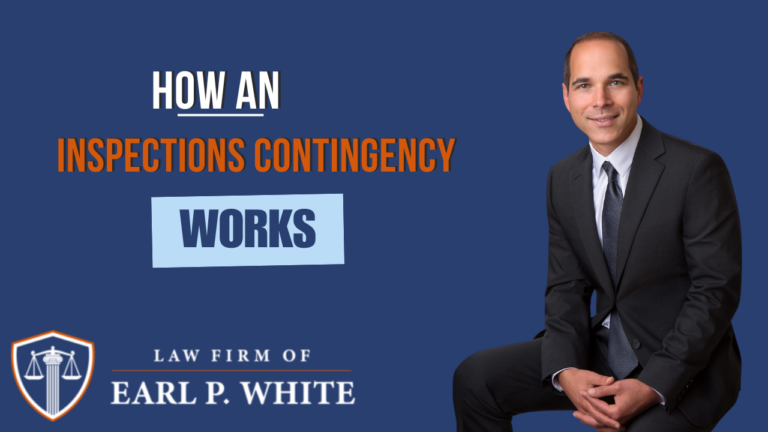Transferring your real estate property into a Limited Liability Company (LLC) in New Jersey is a strategic investors make to protect their assets and streamline tax benefits. Understanding the steps involved and the legal implications of a deed transfer to an LLC is crucial for a smooth transition.
Whether you’re safeguarding a residential rental property or a commercial real estate asset, this comprehensive guide will walk you through the essentials of transferring property to an LLC in New Jersey. Additionally, learn how an LLC can shield your personal assets from liabilities associated with the property and enhance your overall investment strategy.
Members of our free Real Estate Law Newsletter receive exclusive access to resources for landlords, investors, and other real estate professionals. Join today!
Why Transfer Real Estate into an LLC?

A limited liability company (“LLC”) is a separate legal entity that can own, buy, and sell real estate, and shield its owners from personal liability for the debts and obligations of the business. Real estate investors transfer their properties into an LLC to protect their personal assets from lawsuits and creditors.
If a tenant or visitor gets injured on the property, such as a dog bite or fire for example, the injured party can only obtain compensation from the LLC and not the individual owner.
The New Jersey Limited Liability Act establishes an LLC’s asset protection.
See NJ Rev Stat § 42:2C-30 “30. Liability of Members and Managers. a. The debts, obligations, or other liabilities of a limited liability company, whether arising in contract, tort, or otherwise: (1) are solely the debts, obligations, or other liabilities of the company; and (2) do not become the debts, obligations, or other liabilities of a member or manager solely by reason of the member acting as a member or manager acting as a manager.”
NJ courts explained: “The protection of an LLC manager from liability for acts or omissions of the LLC is fundamental to the Act. In this sense, the LLC business form incorporates the bedrock principle of immunity afforded to corporate shareholders. A fundamental rule of law is that the corporation is a separate entity with legal rights and liabilities distinct from those of its shareholders, directors, or officers. One of the principal objectives of incorporation is for the shareholders to achieve limited liability.” Mazzie’s v. Forlenza P’ship, 2016 N.J. Super. Unpub. LEXIS 2573, *7-8.
Transferring real estate into an LLC also includes the following benefits:
- An LLC provides privacy by keeping the owner’s name and personal information off the public records of the property deed and the tax rolls.
- When a property owner dies, their real estate may have to go through the potentially long and expensive probate process. However, if the property is owned by an LLC, the owner can design the LLC to bypass probate by having LLC membership interests upon death automatically transfer to heirs or other members.
- By holding property in a separate LLC, the owner can keep track of the income and expenses of each property more easily and avoid mixing personal and business finances. This can also simplify tax reporting and auditing.
How to Transfer Real Estate into an LLC in New Jersey?

Transferring real estate into an LLC in New Jersey involves several steps, which may vary depending on the type and location of the property, the terms of the existing mortgage or lease, and the specific requirements of the county where the property is located. However, the general steps are as follows:
Step 1: Forming the LLC With the State of New Jersey

The first step to form an LLC in New Jersey is to choose a name that is unique and complies with the state’s rules. The name must include the words “limited liability company” or the abbreviation “LLC” or “L.L.C.” The name cannot be the same as or deceptively similar to another business entity registered in New Jersey.
You can check the availability of your desired name by searching the New Jersey’s Business Name Availability search or by calling (609) 292-9292.
After you’ve chosen the business name, the next step is to file a certificate of formation. You can file for your certificate with New Jersey’s Online Business Formation tool. The certificate of formation is a document that provides basic information about your LLC, such as its name, address, purpose, duration, and registered agent. The registered agent is a person or entity that agrees to receive legal notices and service of process on behalf of your LLC. You can file the certificate of formation online or by mail, and you will need to pay a filing fee of $125.
Another option to form an LLC in New Jersey is to hire an attorney to assist you with the process. This can have several advantages, such as saving you time and hassle, ensuring compliance with the state laws and regulations, protecting your personal and business assets, and providing you with expert advice and guidance.
An attorney can help you choose the best name for your LLC, draft and file the certificate of formation, create a customized operating agreement, obtain an employer identification number (EIN), register for taxes and licenses, and handle any legal issues that may arise, and give you peace of mind and confidence your LLC is set up correctly and legally.
Step 2: Drafting and Executing an Operating Agreement

Once the LLC is formed, businesses should create an operating agreement.
An operating agreement is a document that outlines the rules and regulations for running your LLC, such as the roles and responsibilities of the members, the allocation of profits and losses, the voting rights, and the procedures for adding or removing members. An operating agreement is not required by the state, but it is highly recommended to avoid disputes and confusion among the members.
See IE Test, LLC v. Carroll, 226 N.J. 166, 177-78 (2016) (“The Limited Liability Act authorized LLC members to enter into an operating agreement governing the affairs of an LLC and the conduct of its business. The statute encouraged LLC members to collectively devise an individualized governance and management plan that best advanced the goals of their business.”)
An operating agreement can be written by the members themselves or with the help of a lawyer. It can be customized to suit the specific needs and preferences of your LLC. An operating agreement should be signed by all the members and kept in a safe place along with the certificate of formation and other important documents.
Risks and problems due to not having an operating agreement include:
- LLC must follow New Jersey’s default rules if there is no operating agreement which are not optimized for your LLC.
- Risk of conflict and deadlocks without a method for dispute resolution.
- Less chance of raising capital, attracting investors, or obtaining loans, as business professionals often demand an operating agreement.
- Risk of the court allowing creditors to “pierce the corporate veil”, disregarding your limited liability status as an LLC with no rules appears like your alter-ego or a shell company.
- No plan for adding new members, members exiting, dissolutions, or sale of interests.
Step 3: Collecting a Copy of the Previous Deed

You need a copy of the previous deed before you can transfer real estate into an LLC because the deed contains the legal description of the property. The legal description is a detailed and precise way of identifying the property’s location, boundaries, and dimensions, using survey data, landmarks, or coordinates.
The legal description is different from the street address, which may not be unique or accurate. The county will not record the deed without the legal description.
There are two ways to obtain a copy of the previous deed for your property.
Visit the website of the county recorder and search by property address, lot and block number, or owner name. You may be able to download the deed online or request a copy by mail or in person. Examples of county recording websites in New Jersey include: Bergen County, Essex County, Hudson County, Passaic County.
If the deed is not online (perhaps due to it being very old), a title company can conduct a title search and provide a copy of the deed along with other recorded documents. Although title searches are not free, the search will also verify any existing liens or title problems.
Step 4: Obtaining Approval From Your Lender

Owners with mortgages on their property generally require approval of the lender to avoid triggering the “due-on sale” clause. This clause allows the lender to demand immediate payment of the entire loan balance if the owner transfers the property. The lender would have the right to foreclose if the owner failed to pay off the loan after exercise of the due on sale clause.
The due-on-sale clause in the FannieMae/Freddie Mac Uniform Mortgage Form 3031 states: “If all or any part of the Property or any Interest in the Property is sold or transferred . . .without Lender’s prior written consent, Lender may require immediate payment in full of all sums secured by this Security Instrument.”
However, you can transfer property to an LLC with a conventional mortgage in New Jersey without trigging the “due on sale clause” under specific circumstances. Fannie Mae and Freddie Mac must allow a transfer to an LLC under circumstances where the owner has a substantial interest in the LLC and the transfer does not violate the mortgage terms.
See Fannie Mae, D1-4.1-02, Allowable Exemptions Due to the Type of Transfer (“The servicer must process the following exempt transactions without reviewing or approving the terms of the transfer to . . . a limited liability company, provided that (1) the mortgage loan was purchased or securitized by Fannie Mae on or after June 1, 2016, and (2) the LLC is controlled by the original borrower or the original borrower owns a majority interest in the LLC, and if the transfer results in a permitted change of occupancy type to an investment property, such change does not violate the security instrument (for example, the 12 month occupancy requirement for a principal residence).”)
See Freddie Mac, Section 8.406.4, Additional permitted Transfers of Ownership (“Freddie Mac will not . . . restrict a Transfer of Ownership . . . to a limited liability company . . . provided that the managing member/general partner of the LLC/LP is the original Borrower. If there are multiple Borrowers, all of them must be members/partners of the LLC/LP, and at least one of them must be a managing member/general partner. If the transfer results in a permitted change of occupancy type to an investment property, such change must not violate the Security Instrument (e.g., the 12-month occupancy requirement for a Primary Residence).”)
Step 5: Preparing and Signing the Deed and Conveyance Documents

The deed is the legal document that transfers ownership in real estate to your LLC.
The deed must include the legal description, the names of the grantor (person transferring ownership) and grantee (LLC receiving ownership), signatures of the grantor, and list the consideration (money or value exchanged for the property).
Besides the deed, you may also need prepare and sign when transferring to your LLC:
- GIT/REP3 Form (Seller’s Residency Certification/Exemption). The GIT/REP-3 form in New Jersey is a Gross Income Tax form used for residency certification or exemption when selling or transferring real property.
- RTF-1 Form (Affidavit of Consideration For Use By Seller). This form must be submitted with any deed in which a seller claims a full or partial exemption from the Realty Transfer Fee (RTF). The RTF itself applies to every conveyance of title to real property within the state unless the deed or transfer qualifies for an exemption
Learn more about deed requirements in our blog Valid and Recordable Deeds in New Jersey.
Step 6: Submitting Deed For Recording

Once the deed is executed, the deed is submitted to the county for recording. Deeds are normally e-recorded – paper filing is allowed but not frequently used by real estate recording companies.
There are three standards costs to record a deed:
- County Recording. Each county has a cost paid to the county to record deeds. Deed recording are listed on county clerk websites, for example: Essex County, Bergen County, Hudson County, and Passaic County.
- E-Recording. E-recording is the preferred method of recording. E-recording companies charge around $100.00 to $150.00 dollars to handle.
- Realty Transfer Fee. If there is an open mortgage on the property, Realty Transfer Fee must be paid on the balance owed on the mortgage to the NJ Division of Taxation (unless the transfer qualifies for an exemption). New Jersey Realtors® has an easy to use Realty Transfer Fee calculator to determine the Realty Transfer Fee owed on the transfer. There is no exception for transferring into an LLC even if you personally owned the property and are the sole member of the LLC.
Counties review the deed submitted for e-recording in 14 to 30-days. County staff may request changes to the deed and conveyance documents.
The county staff’s requests may be simple corrections, but in also may be of a legal nature. Legal issues often arise with estates, powers of attorney, and claimed exemptions to the Realty Transfer Fee. The individuals reviewing the deeds for each county are not attorneys and may have an incorrect legal analysis. Each county – even staff members for the same county – may request different changes of the same deed.
The simplest process is to make changes requested by county staff. If county staff requests impossible or legally impermissible changes, you need to elevate the issue to a supervisor, county clerk, or municipal attorney.
Once recorded, deeds are assigned a book number, page number, and instrument number. You can utilize this information to find your deed on the county recorder website.
Step 7: Obtain a Tax ID For Your LLC

An LLC should obtain federal a tax ID (Employer Identification Number “EIN”).
The EIN is a unique nine-digit number that identifies an LLC for tax purposes. A federal tax ID enables the LLC to:
- File taxes as a separate entity from its members, which has tax benefits and supports liability protection from attempts to “pierce the corporate veil”.
- Open a bank account in its name and keep its finances separate from its members. This maintains its credibility and legitimacy as a business entity.
- Hire employees or contractors, pay payroll taxes, and comply with other federal and state regulations.
You can apply for an EIN online, by mail, by fax, or by phone, depending on your preference and eligibility. The online application is the fastest and easiest method, and you will receive your EIN immediately after completing it.
Applying requires a valid Social Security number or individual taxpayer identification number, and you will need to provide information about your LLC, such as name, address, date of formation, and number of members. Access the online application here: How to Apply for an EIN.
Step 8: Notifications: Tenants, Government Agencies, and Insurance Providers

Tenant Notification
Tenants must be notified of the property transfer to the new owner LLC. This notification is called an “letter of attornment”. Attornment letters should include:
- Name and address of the former landlord and the date of the transfer
- Name and address of the new landlord and the contact information for rent payments and maintenance requests
- Statement that the terms and conditions of the existing lease or rental agreement remain unchanged and binding
- Request for the tenants to sign and return a copy of the letter to the new landlord as proof of their attornment
Letters of attornment protect the rights and obligations of the new landlord and tenant by avoiding confusion or disputes over the change of ownership. Lease and other forms should be updated for the new landlord name.
Landlords should include a “SUCCESSOR AND ASSIGNS” provision in tenant leases to ensure compliance and cooperation with the attornment letter and to recognize the new landlord. This lease provision states the rights and obligations of the tenant under the lease will continue to be valid and enforceable even if the property is sold or transferred to a new owner.
Members of our free Real Estate Law Newsletter receive exclusive access to resources for landlords and other real estate professionals. Join today!
Government Agency Notification
When ownership of a rental property changes, it is imperative to update relevant government agencies to ensure regulatory compliance and an uninterrupted management of services. This includes, for property subject to multiple-dwelling and hotel law, notifying the New Jersey Department of Community Affairs (DCA), as they oversee the Division of Housing and Community Resources which administers housing assistance programs like the Section 8 Housing Choice Voucher Program and the Homelessness Prevention Program. Property owners must submit an Owner Change Request through the NMA Portal to inform the NJ DCA.
Additionally, landlords need to update their verification documentation, including W9 forms and Direct Deposit Authorization, to ensure continuity in receiving rental assistance payments and to comply with legal requirements. Failing to notify these agencies can result in penalties and disruptions in rental assistance, highlighting the importance of timely administrative updates when property ownership changes. Additional parties to notify regarding the transfer include: insurance companies, utility providers, and your property transfer.
Step 9: Update Property Insurance & Estate Planning Documents

Property insurance should be updated after transferring ownership to an LLC to avoid any gaps in coverage, higher premiums, or even cancellation of your policy. Inform your current insurance provider about the change in ownership to ensure that the LLC is listed as the insured party on the policy. You may need to obtain a new policy that covers commercial or rental properties.
Updating your estate plan is also important for avoiding probate, reducing taxes, and protecting your heirs from creditors or lawsuits. Your estate plan should take into consideration that you owner the property through an LLC and not personally. You may need to revise your will, trust, power of attorney, or beneficiary designations to ensure that your wishes are carried out in case of death or incapacity.
Step 10: Opening a Business Account For the LLC

Opening a new business bank account is advisable following transferring real estate into your LLC.
A separate business account lowers the risk of losing limited liability status to the legal doctrine of “piercing the corporate veil”. An injured party may then “pierce the corporate veil” and remove limited liability status by showing: (1) the LLC was “dominated” or an “alter ego” of the individual owner, and (2) adherence to the fiction of separate corporate existence would perpetrate a fraud or injustice, or otherwise circumvent the law. Verni ex rel. Burstein v. Harry M. Stevens, Inc., 387 N.J. Super. 160 (App. Div. 2006). Commingling personal and business money signals your LLC is a sham / fictional company.
A business bank account for the LLC simplifies accounting and tax reporting. You can more easily track income and expenses of the property across one account. This will also make it easier to prepare and file the tax returns, and to comply with state or federal regulations. Profit Line USA explained a separate account “simplifies tax reporting, enhances financial transparency, aids in tracking deductible expenses accurately, and contributes to better overall financial management.”
A third reason to open a business bank account for the LLC is to enhance the professionalism and credibility of the business. By using a business bank account, the investor can issue checks, receive payments, and access online banking services under the name of the LLC. This will help them create a positive image for their tenants, vendors, lenders, and other parties involved in the property management.
Conclusion
Transferring real estate into an LLC in New Jersey can be a smart move for real estate investors who want to protect their personal assets, reduce their liability, and enjoy other benefits. However, it also involves several steps and costs, and may have some implications for your taxes, your mortgage, and your tenants. Therefore, it is advisable to consult with a qualified attorney and an accountant before making the decision, and to follow the state and county laws and regulations carefully.
Stay ahead with our free newsletter: The Real Estate Law Newsletter – your source for real estate law news.
Essential updates and insights direct to you. Impress clients and colleagues with trending news. Sharpen expertise. Stay legally compliant. Access free legal forms. Don’t miss out – join today!









